Florida Medical Education Gift Has Global Impact
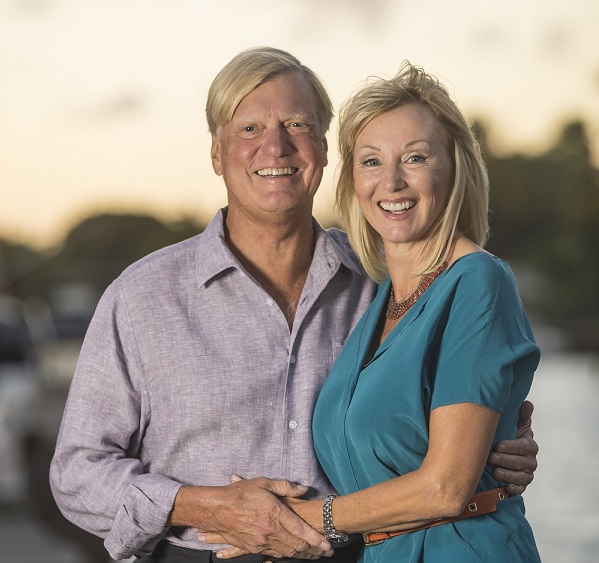
The Smith International Surgical Scholarships fund, directed by Steven Wexner, MD, Chair of Cleveland Clinic Weston Department of Colorectal Surgery, is sponsoring 70 surgical scholarships from 21 countries. The fund enables colorectal surgeons from economically disadvantaged countries to train with experts from around the world to improve patient care and outcomes.
Training the Next Generation
The Smith’s initial gift of $20,000 has grown to more than $200,000, thanks to support from 18 other donors. The Smith’s goal is to continue supporting Dr. Wexner to train the next generation of physicians around the world.
“We’re focused on helping physicians from developing countries gain best-in-class medical expertise," says Ellan Cates-Smith. “No one exemplifies world-class care more than Dr. Wexner, with his expertise, leadership and dedication to education. Our goal is to help support Dr. Wexner train the next generation of physicians not just in the U.S., but in some of the neediest regions of the world. When these physicians return to their countries, they will have the skills and insights to raise the standard of care of their profession and ultimately provide better care to their patients.”
“This program is committed to improving and prolonging the lives of patients throughout the world,” Dr. Wexner says. “The next phase is to create a network of Smith Surgical Scholars so that these advances can continue to be perpetuated in the home hospitals of these awardees.”
Nationally Ranked
The Department of Colorectal Surgery at Cleveland Clinic Florida is the largest colorectal surgery center in Florida and has the largest colorectal residency-training program in North America. In addition, Cleveland Clinic Weston’s Gastroenterology & GI Surgery program is among the best in the nation, ranking No. 29 out of 4,500 hospitals, according to the 2020-21 U.S. News & World Report “Best Hospitals” guide.
“I am gratified that our colleagues throughout the country continue to recognize us as the only nationally ranked center in South Florida for adult gastroenterology and GI surgery,” Dr. Wexner says. “That ranking, and our high performance in colon cancer surgery, are fundamental and essential to our listing for three consecutive years as the No. 1 hospital in South Florida.”
Pedaling 200 Miles for Cancer Research in Memory of ‘Ma’
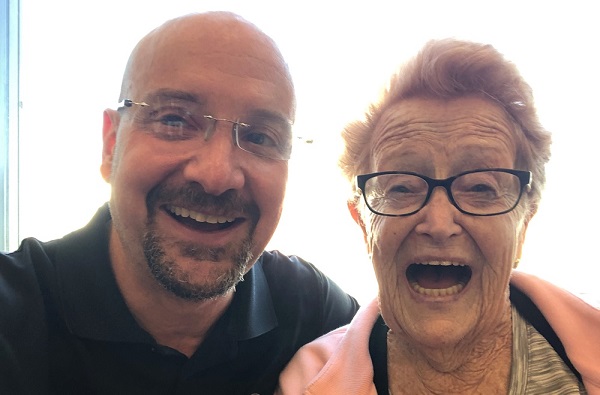
Raising a large amount of money requires a large effort.
And with a name like Wheeler, it makes sense that Andrew Wheeler would commit to “wheeling” 200 miles — in one day — to raise money in honor of his mother.
Ann Orkin, 82, was diagnosed with pancreatic cancer in June 2019 and passed away four months later.
Andrew had a close relationship with his mom, who went by several nicknames including Chana Leah, Ma and Bubbe. He says she loved playing the part of being an old lady and would tell people she’d say and do as she pleased because she’d earned that right – to the delight of those around her.
“Ma lived a good life, a full life, and she told me as much just a few weeks before she passed away,” Andrew says. “Sure Ma was 82, but she was a strong and spry 82, and I truly feel she was robbed of some of the best years of her life by this awful disease.”
Andrew’s dedication to VeloSano was fueled by his ultimate goal of raising funds toward early cancer screening and detection, more effective medications to extend life, and improved quality of life for those fighting cancer.
After watching his once vibrant mother face four “tortuous, exhausting, debilitating months” of chemotherapy, he made the commitment to tackle 200 miles on his bike, which is named Chana Leah for his mom, and set a goal of $8,000.
An avid cyclist, Andrew rode the distance and also eclipsed his goal, raising more than $13,000. His accomplishment made him a top individual fundraiser for VeloSano 2020.
And because the event was virtual this year, Andrew was able to complete his ride in his home state of New Jersey.
In a daylong “epic” ride on Saturday, July 18, beginning at 4 a.m. and finishing around 6:30 p.m., Andrew stayed the course through the blistering heat.
He had originally set out with a riding buddy, but his friend’s rear bike tire blew out around mile 155, so Andrew forged ahead and completed the last 45 miles of the ride alone.
Despite a meticulously planned route, when he arrived home – which was to be his finish line – Andrew’s GPS tracker showed his mileage at 199.6. Although he was completely exhausted, he wanted to honor his commitment so he rode down his street and back to make it an official 200 miles.
“In many ways this ride has brought some closure to the passing of my mom for me,” he says. “The pain is subsiding, and every day my heart aches a little less. I know Ma was with me on this journey and certainly did provide the push up those final hills. The ride may be in the books, but the effort to raise more funds for cancer research at the Cleveland Clinic goes on.”
How You Can Help
It’s not too late to make a gift to VeloSano. Every dollar raised by its participants is allocated to lifesaving cancer research.
Are You At Risk for Hospitalization with COVID-19?
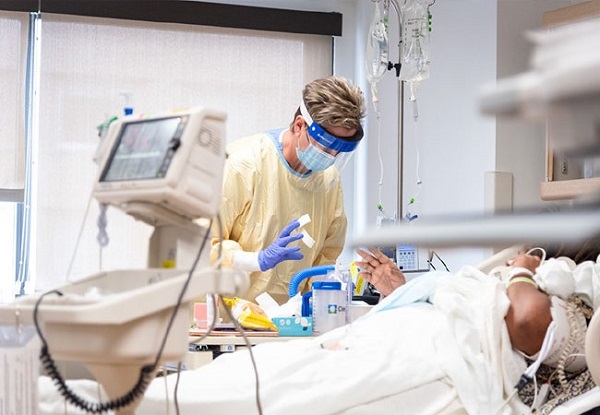
Cleveland Clinic researchers have developed and validated a risk prediction model to help physicians anticipate which patients who test positive for the virus that causes COVID-19 are at greatest risk for hospitalization.
The model was developed and validated using retrospective data from more than 4,500 patients who tested positive for COVID-19 at Cleveland Clinic locations in Northeast Ohio and Florida over three months (early March to early June 2020).
Led by Lara Jehi, MD, Chief Research Information Officer at Cleveland Clinic, and Michael Kattan, PhD, Chair of the Department of Quantitative Health Sciences in the Lerner Research Institute, Cleveland Clinic data scientists used statistical algorithms to transform information from the electronic medical records of patients who are participating in a registry into the risk predication model.
When comparing characteristics between patients who were and were not hospitalized due to COVID-19, the researchers discovered several previously undefined risk factors for hospitalization including:
- Smoking status: Former smokers were more likely to be hospitalized than current smokers.
- Use of ACE inhibitors or ARBs: Univariable analysis showed that patients taking either of two classes of cardiovascular medications — angiotensin-converting enzyme (ACE) inhibitors or angiotensin II receptor blockers (ARBs) — were more likely to be hospitalized than patients not taking those drugs.
- Race: Black patients were more likely to be hospitalized than patients of other races.
Dr. Kattan, an expert in developing and validating prediction models for medical decision-making, cautions that additional studies will be needed to further explore the association between ACE inhibitors and ARBs and hospitalization.
“In our study, taking these drugs was only found to confer increased risk for hospitalization when run through univariable analysis, which means the observed association could be the result of confounding variables, like a preexisting condition,” he explains.
The team’s findings also revealed that patients with symptoms including fever, shortness of breath, vomiting and fatigue were more likely to be hospitalized.
The study confirmed other associations previously well established in the literature, including higher risk of hospitalization among older people, men, patients with comorbidities such as diabetes and hypertension, and individuals from lower socioeconomic backgrounds (as determined by ZIP code).
Clinical implications
“Hospitalization can be used as an indicator of disease severity,” notes Dr. Jehi. “Understanding which patients are most likely to be admitted to the hospital for COVID-19-related symptoms and complications can help physicians decide not only how best to manage a patient’s care from the time of testing but also how to allocate beds and other resources, like ventilators.”
The study was funded in part by the National Institutes of Health through the Clinical and Translational Science Collaborative of Cleveland and is freely available as an online risk calculator.
The new model is the second COVID-19-related risk model developed by the research team. Their earlier prediction model forecasts an individual patient’s likelihood of testing positive for the virus.
“Ultimately, we want to create a suite of tools that physicians can use to help inform personalized care and resource allocation at many time points throughout a patient’s experience with COVID-19,” Dr. Jehi says.
How You Can Help
Your gift to the COVID-19 response fund will help further research like this and other critical projects. Please make a gift today.
Investigating A New Drug to Control Alzheimer’s
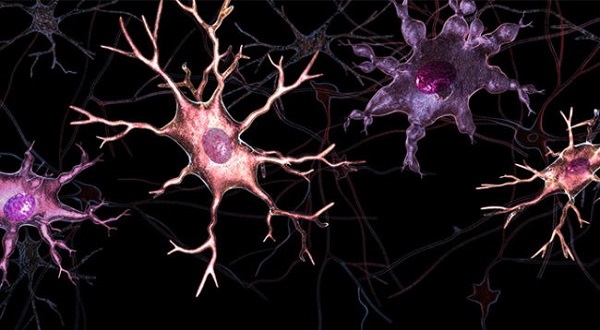
Anyone who knows or cares for a loved one with Alzheimer’s disease understands the cruel, debilitating nature of the disease and the quality of life it robs from those affected.
According to the Alzheimer’s Association, more than 5 million Americans are living with the disease and that number is projected to rise to nearly 14 million by 2050.
And while there is no cure for Alzheimer’s disease, new approaches to treatment are being studied every day – including research happening right here in Cleveland.
NeuroTherapia, a Cleveland-based spin-off company created by Cleveland Clinic Innovations, is guided by the research of Joseph Foss, MD, and the late Mohamed Naguib, MD.
The company is developing a new drug that focuses on microglia – immune cells in the central nervous system that can cause inflammation in the brain, which is a hallmark trait of Alzheimer’s disease.
“This drug represents a new approach to controlling Alzheimer’s disease, different from the many earlier targets which have not proven to be successful,” says Dr. Foss. “We are focused on controlling the inflammation that damages the normal brain cells, and that could alter the course of the disease.”
The work of Dr. Foss and his team has raised financial support from Cleveland Clinic Innovations, the Alzheimer’s disease Drug Discovery Foundation, the Alzheimer’s disease Association, the Dolby Family Fund and the Brain Trust.
“Support from philanthropy can make an important difference in bringing discoveries like this to our patients,” says Dr. Foss.
With a Brush of Inspiration, Artist Supports Florida Caregivers
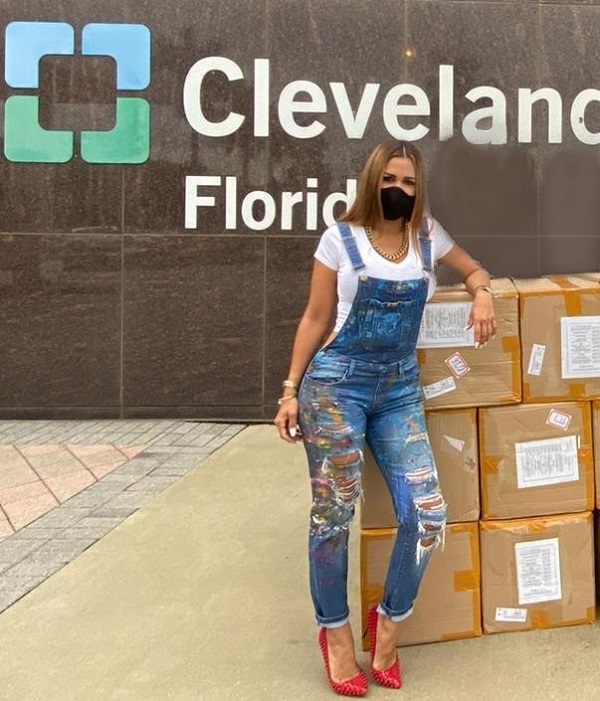
Model and actress Leidy Mazo, best known for the blockbuster film Transformers: Dark of the Moon, has built a career on artistic expression. She enjoyed her time in front of the camera, but after becoming a mother, she changed course and painting is now her creative outlet.
A promising new pop artist in the Miami art scene, Leidy creates treasured pieces, many of which show solidarity for the grief and adversity experienced in the world today.
“All over the world,” she says, “people are fighting and hurting each other. It’s overwhelming for everyone in society to see this in the news every day, so I created a collection to support the troops as they fight for peace and love.”
After seeing hospitals struggle to keep personal protective equipment on hand for front-line healthcare workers, Leidy pivoted to support Cleveland Clinic Florida's COVID-19 Emergency Response efforts with a donation of 16,000 KN-95 masks.
“When I’m painting, sometimes for hours on end, I use KN-95 masks to protect myself from the fumes. This inspired me to make an impact on the fight against the spread of the coronavirus,” Leidy says. “I wanted these vital KN-95 masks to go to those who need it the most—the healthcare workers who are putting their lives on the line for us every single day.”
How You Can Help
When you make a gift to Cleveland Clinic Florida’s COVID-19 Emergency Response, the funds and supplies are put to use immediately to support front-line caregivers and fund critical research and treatment to help combat the coronavirus pandemic.

